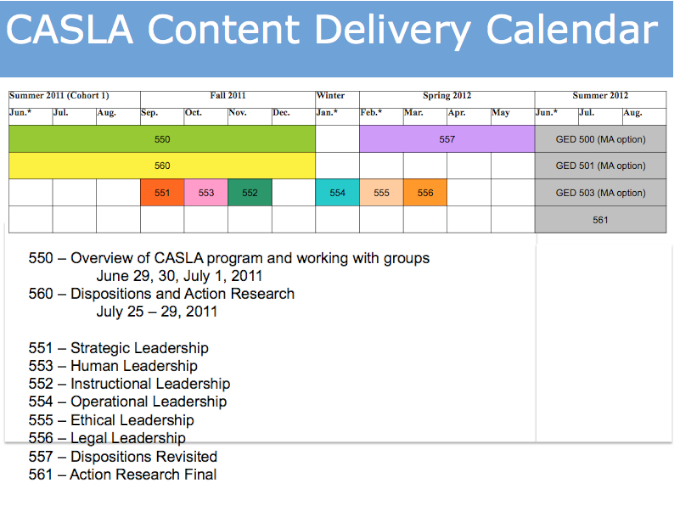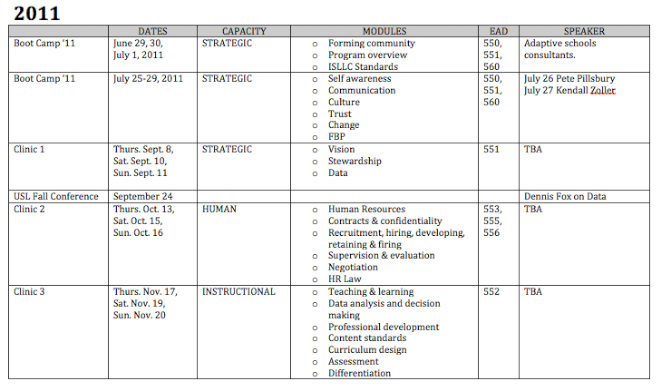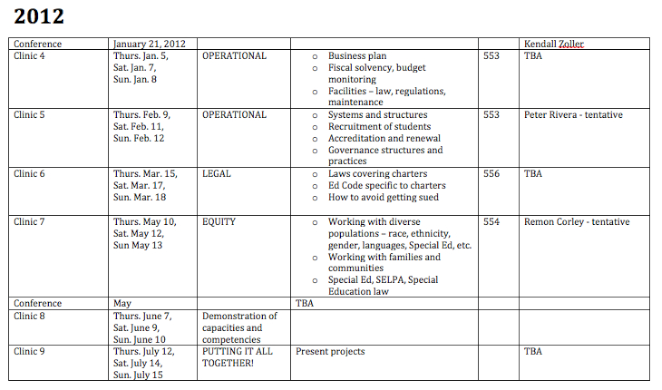CASLA PROGRAMS
The CASLA Program is an accelerated program, structured in a cohort model for continual support and networking purposes. Coursework is just over one year, and the total commitment to the program is two years.
The CASLA program is based on six leadership capacities: strategic, human, instructional, operational, legal, and equity. The program begins with two "boot camps" – clinics that are designed to provide overviews of the program, the expectations, and in-depth self-reflection of skills by the participants.
The CASLA Cohort will meet through virtual means (via the internet) on one Thursday evening, and then in face-to-face classes on a Saturday and Sunday. See below for the tentative schedule for 2011-2012. Each month a focus will be on one of the capacities and be divided into specific modules for in-depth study. Charter experts will visit the cohort each weekend – sometimes in person, sometimes via the web, to provide real life, in-depth information about the charter and autonomous schools' world.
Between each meeting, CASLA program participants will have additional assignments. These will assist in the development of deep knowledge needed by charter and autonomous schools' leaders as well as provide opportunities to prepare for the next clinic.
In addition, CASLA program participants will attend two conferences, one in January and one in May. These conferences will further support the learning for the future leaders of charter and autonomous schools.
CASLA OUTCOMES
- If eligible, participants will earn a Tier I Administrative Services credential.(To be eligible, applicants must have a California teaching credential and have taught for a minimum of 3 years).
- If eligible, participants may also earn a Tier II Administrative Services credential
- Participants may earn a Masters’ of Arts in Education
- Non-credentialed participants or participants with less than three years of teaching experience will earn a Certificate in Charter School Leadership
6 CAPACITIES OF CHARTER AND AUTONOMOUS SCHOOL LEADERSHIP
STRATEGIC CAPACITY including Dispositions and Action Research
- Forming community
- Program overview
- ISLLC standards
- Self-awareness
- Communication
- Culture
- Change
- Action Research
- Vision
- Stewardship
- Data
- Human Resources
- Contracts and Confidentiality
- Recruitment and hiring of adults, developing, retaining, and firing
- Supervision and evaluation
- Negotiation
- Human Resource Law
- Teaching and learning
- Data analysis and decision-making
- Professional development
- Content standards
- Curriculum design
- Assessment
- Differentiation
- Business plan
- Fiscal solvency, budget monitoring
- Faculties – laws, regulations, maintenance
- Systems and structures
- Recruitment of students
- Accreditation and renewal
- Governance structures and practices
- Laws covering charters
- Ed Code specific to charters
- How to avoid being sued
- Working with diverse populations – race, ethnicity, gender, language, Special Education, etc.
- Working with families and communities
- Special Education including: SELPAs, Special Education law, etc.



CASLA Action Research Project
A specially designed outcome of the CASLA program is the completion of an action research project by each CASLA participant. The purpose of this project is to provide CASLA participants will real life experience in leading a change so they can practice needed leadership skills in a safe environment.
The topic of the research will be determined by the participant in conjunction with their mentor. (The expectation is that in the 2011-2012 school year, the leader of the participant's school will be their mentor).
The project consists of identification of a need at the school site based on data analysis and input from a variety of stakeholders. Once a need is determined the CASLA participant in conjunction with their school leader will work together to establish the scope and focus of the project.
CASLA participants will be required to identify a specific group of adults with whom they will work. Once identified, CASLA participants will gather data on the current status of the adult participants, lead staff development and data analysis throughout the project, capture pre-assessment data about students (curricular, attendance, etc. depending on the project), and collect formative and summative data about student changes. In addition, the CASLA participants will collect formative and summative data about changes in adults' behaviors, skills, and/or practices as a result of their project.
The leader of the school will be expected to monitor the project and sign off as to whether the CASLA participants have demonstrated the expected leadership behaviors. Members of the CASLA team will help mentors guide their students as well as support the CASLA participants and their mentors throughout the project. At the end of the 15 month program, CASLA participants will have an opportunity to share their research with other administrators as well as their peers. We anticipate that the completed projects will also be a great strategy to communicate with charter and autonomous schools' boards as to the school changes and outcomes that have occurred as a result of the research.

